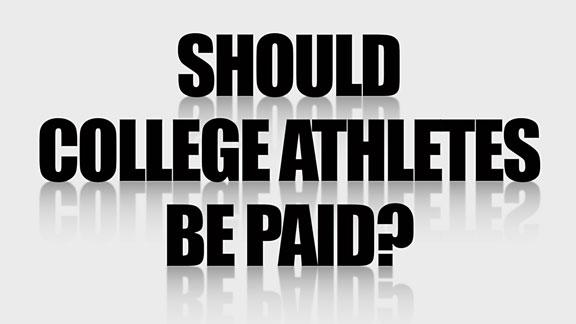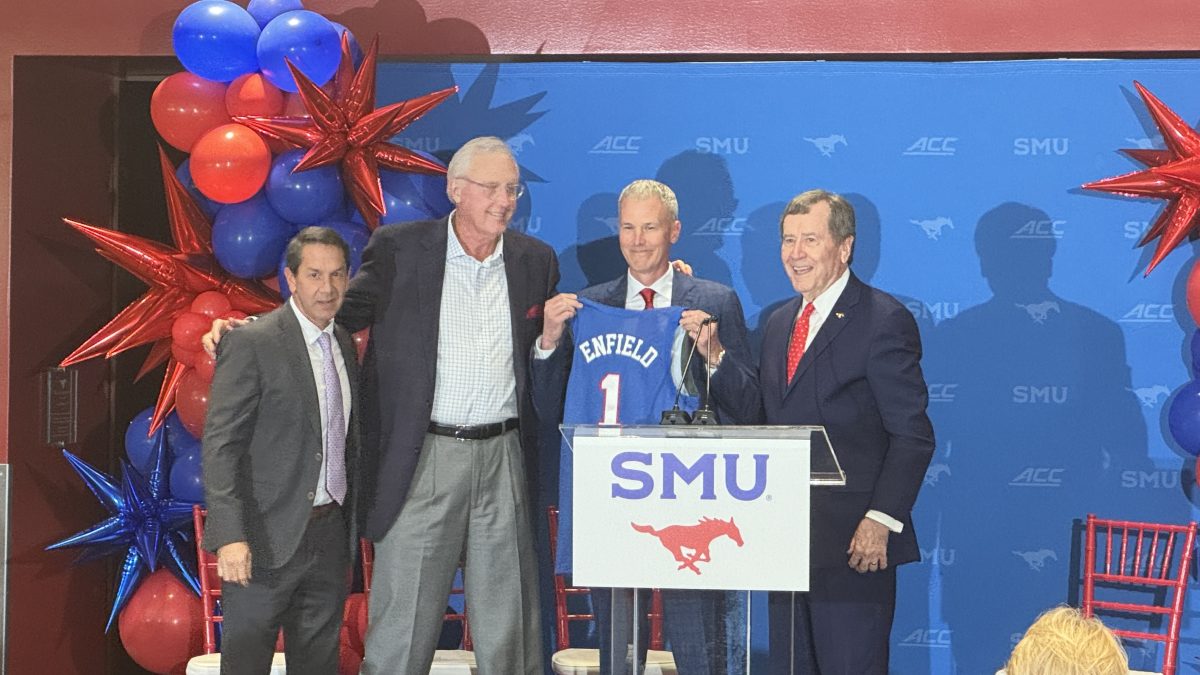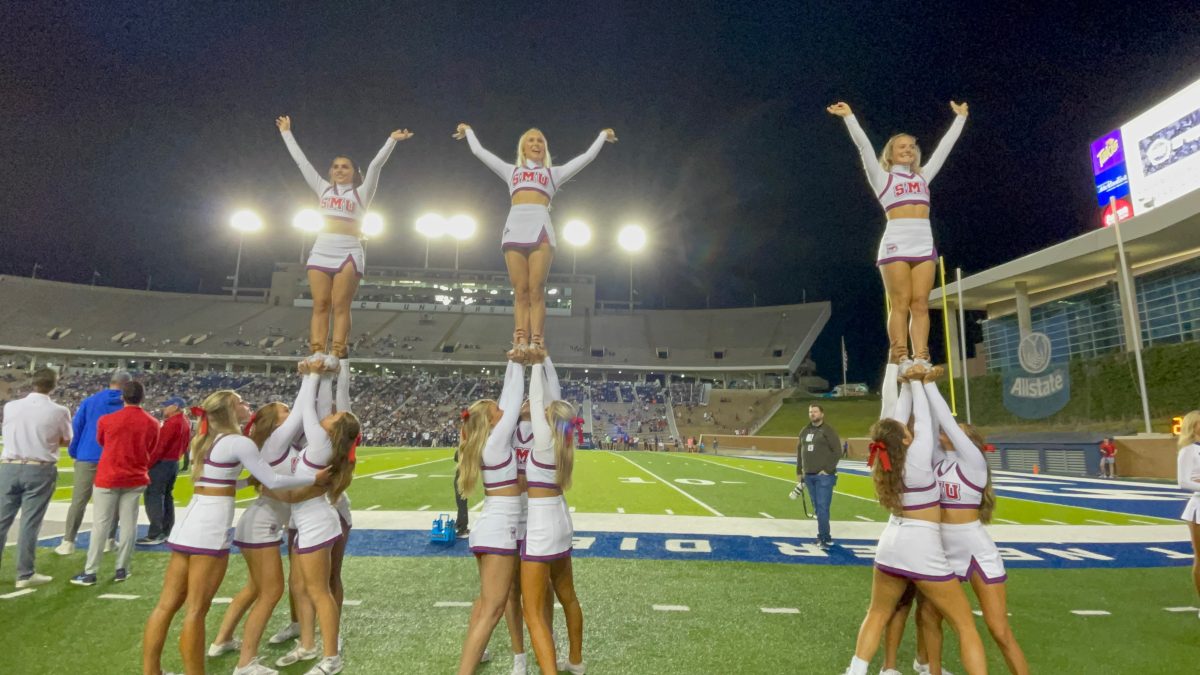
By Lucy Brock
One of Nicky Petrucelli’s fondest memories of his childhood is captured in an old photograph that he keeps in his wallet. In the photo, he and his father, Chris, are kicking a soccer ball around a field at Notre Dame. At the time, Petrucelli was just three years old and his father was the coach of the women’s soccer team at Notre Dame.
“I always knew I wanted to play [soccer] in college,” Petrucelli said. “When I was in middle school, all the older boys in the club were getting scouted, and naturally I wanted to be just like them.”
Now 19 years old, Petrucelli plays left defender on the SMU men’s soccer team and his dad coaches the SMU women’s soccer team. Nicky is also a full-time student majoring in journalism in the Meadows School.
On top of his full class schedule, Petrucelli dedicates upwards of 25 hours per week, even in the off-season, to soccer.
“It’s a lot,” said Petrucelli. “I don’t have time to find a real job because of how much time school and soccer take up. It feels like soccer is my full-time job.”
One of the most prominent debates right now in college sports is whether or not student-athletes should be paid. According to Marc Edelman of Forbes Magazine, the NCAA makes around $11 billion annually from college sports, and student-athletes do not receive any of the profit.
While many critics argue that student-athletes should no longer be considered amateurs at the college level, many also argue that a free education is enough compensation.
In March, the National Labor Relations Board ruled that large-scale athletes are definitely employees of their universities.
The ruling came after Northwestern University rejected a former quarterback’s movement to form a union of football players to obtain benefits such as medical coverage for players who had suffered lifelong issues because of football-related injuries.
According to Fred Barbash of the Washington Post, the NLRB got involved and Chicago Regional Director Peter Sung Ohr ruled that “big-time college football players on a full ride are… paid employees of their universities.”
The impact? Football players at Northwestern are now legally entitled to form a union. The ruling does not affect student-athletes at public universities, since they are governed by state law. Student-athletes at other private institutions can seek approval from the NLRB to unionize, and once Northwestern decides on the compensation that their football players will receive, it is likely that all college football players will receive the same benefits.
The NCAA and Northwestern University disagreed with this ruling, but according to Clay Travis of FOX Sports, “The NCAA is a dead man walking.”
Other NCAA student-athletes see themselves as less of an employee, but still believe they are not amateurs and should be compensated. Shabazz Napier, University of Connecticut’s former star point guard, AAC Player of the Year, and two-time NCAA Champion, reported that he often went to bed “starving” because he could not afford food.
Napier told the Washington Post, “We as student-athletes get utilized for what we do so well, and we’re definitely blessed to get a scholarship to our universities. But at the end of the day, that doesn’t cover everything. We do have hungry nights that we don’t have enough money to get food in. Sometimes money is needed.”
But many student-athletes also support the idea that a free education is enough compensation.
“I personally don’t think we should be paid on top of our scholarships,” said sophomore Julia Fowler, a member of SMU’s equestrian team.
“Even though we do have a more demanding schedule than a regular student, when you think about how much money we are getting, especially for someone who has a full scholarship, that adds up to being paid like the equivalent of hundreds of thousands dollars worth of tuition, room, and board, and food,” Fowler said.
Richard Burton, a professor of Sport Management at Syracuse University, argued the same thing: college athletes are already paid with their education. While this is the most common argument against paying student-athletes, there are other factors to consider.
Evelyn Field, a sophomore psychology major at SMU, and Molly Block, a senior mass communications student at Texas State University, said paying student-athletes would create an even bigger divide between large and small university athletic programs and the athletes would become solely focused on money.
Block said, “Larger schools with more revenue…would essentially be able to buy out the best players for their teams, putting small universities at a greater disadvantage. College sports and the athletes who participate in them should not be centered on money. Athletes should focus on their passion for whatever sport they play, and be grateful they can receive the aid they do.”
Mason Gentry, a sophomore football player, offers a relaxed attitude about the issue. When asked if he thinks football players should be paid on top of their scholarships, he said, “I mean not really. They have stuff to help kids out if they need extra money. Obviously I would not be opposed to them paying me, but I don’t think it is necessary.”
The question of whether NCAA amateurism is an illusion or not cannot be answered simply, though many have tried. Professors, columnists, sports analysts, and politicians have been debating the topic of whether or not student-athletes should be paid for years, and it does not seem that a definitive solution to this problem lies anywhere in the near future.
For Nicky Petrucelli, the answer is not clear either.
“My education is really important to me, but so is soccer. If we were paid, I think it should be based off individual performance, just like in the pros,” he said. “But I don’t know. Maybe we should be paid, maybe not. It’s not up to me. I’ve always loved playing soccer, and I always will. Money wouldn’t change that.”

















